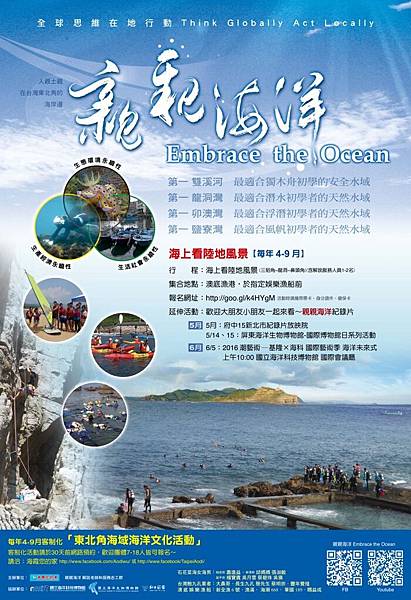http://m.xuite.net/blog/wild.fun/blog/457973949
跟 親親海洋 一樣目標。


概念性定義:
永續旅遊的發展準則與管理實務可以應用在任何觀光景點的所有旅遊形式,包括大眾旅遊及各種特定對象的小眾旅遊。永續原則關照到旅遊發展時所牽涉到的環境、經濟與社會文化等面向,而在追求這三面向平衡發展時,要保證其長期的永續性。
永續旅遊應該:
1.以最理想的方式使用環境資源是旅遊發展的關鍵因素,維持基本的生態過程並保育自然遺產與生物多樣性。
2.尊重在地社區原來的社會文化,維護其過往建立並繼續存在的文化遺產與傳統價值,同時協助不同文化間的理解與寬容。
3.確保切實可行、長程的經濟運作,提供社會經濟福祉給所有的權益相關者,尤其要公平分配,包括對在地社區提供穩定的工作、賺取收入的機會以及各項社會服務,並力求減少貧窮。
永續旅遊發展要求讓所有的權益相關者能資訊靈通的參與相關事務,並需有強力的政治領導以確保廣泛的參與及建立共識。永續旅遊是不間斷的過程,
必須持續監測各種衝擊,而在必要時應該引進預防且/或正確的方法。
永續旅遊應同時維持高水準的遊客滿意度,及確保旅客有個意義深重的經驗,藉以提升他們對永續課題的覺知,同時推廣永續旅遊實務在他們的生活中.
底下是英文內容:Definition
Expressed simply, sustainable tourism can be defined as:
"Tourism that takes full account of its current and future economic, social and environmental impacts, addressing the needs of visitors, the industry, the environment and host communities"
Conceptual definition
Sustainable tourism development guidelines and management practices are applicable to all forms of tourism in all types of destinations, including mass tourism and the various niche tourism segments. Sustainability principles refer to the environmental, economic, and socio-cultural aspects of tourism development, and a suitable balance must be established between these three dimensions to guarantee its long-term sustainability.
Thus, sustainable tourism should:
1) Make optimal use of environmental resources that constitute a key element in tourism development, maintaining essential ecological processes and helping to conserve natural heritage and biodiversity.
2) Respect the socio-cultural authenticity of host communities, conserve their built and living cultural heritage and traditional values, and contribute to inter-cultural understanding and tolerance.
3) Ensure viable, long-term economic operations, providing socio-economic benefits to all stakeholders that are fairly distributed, including stable employment and income-earning opportunities and social services to host communities, and contributing to poverty alleviation.
Sustainable tourism development requires the informed participation of all relevant stakeholders, as well as strong political leadership to ensure wide participation and consensus building. Achieving sustainable tourism is a continuous process and it requires constant monitoring of impacts, introducing the necessary preventive and/or corrective measures whenever necessary.
Sustainable tourism should also maintain a high level of tourist satisfaction and ensure a meaningful experience to the tourists, raising their awareness about sustainability issues and promoting sustainable tourism practices amongst them.
Reference:
Making Tourism More Sustainable - A Guide for Policy Makers, UNEP and UNWTO, 2005, p.11-12
英文資料來源:http://sdt.unwto.org/content/about-us-5
以上參考摘至 賴鵬智的野FUN特區





 留言列表
留言列表

